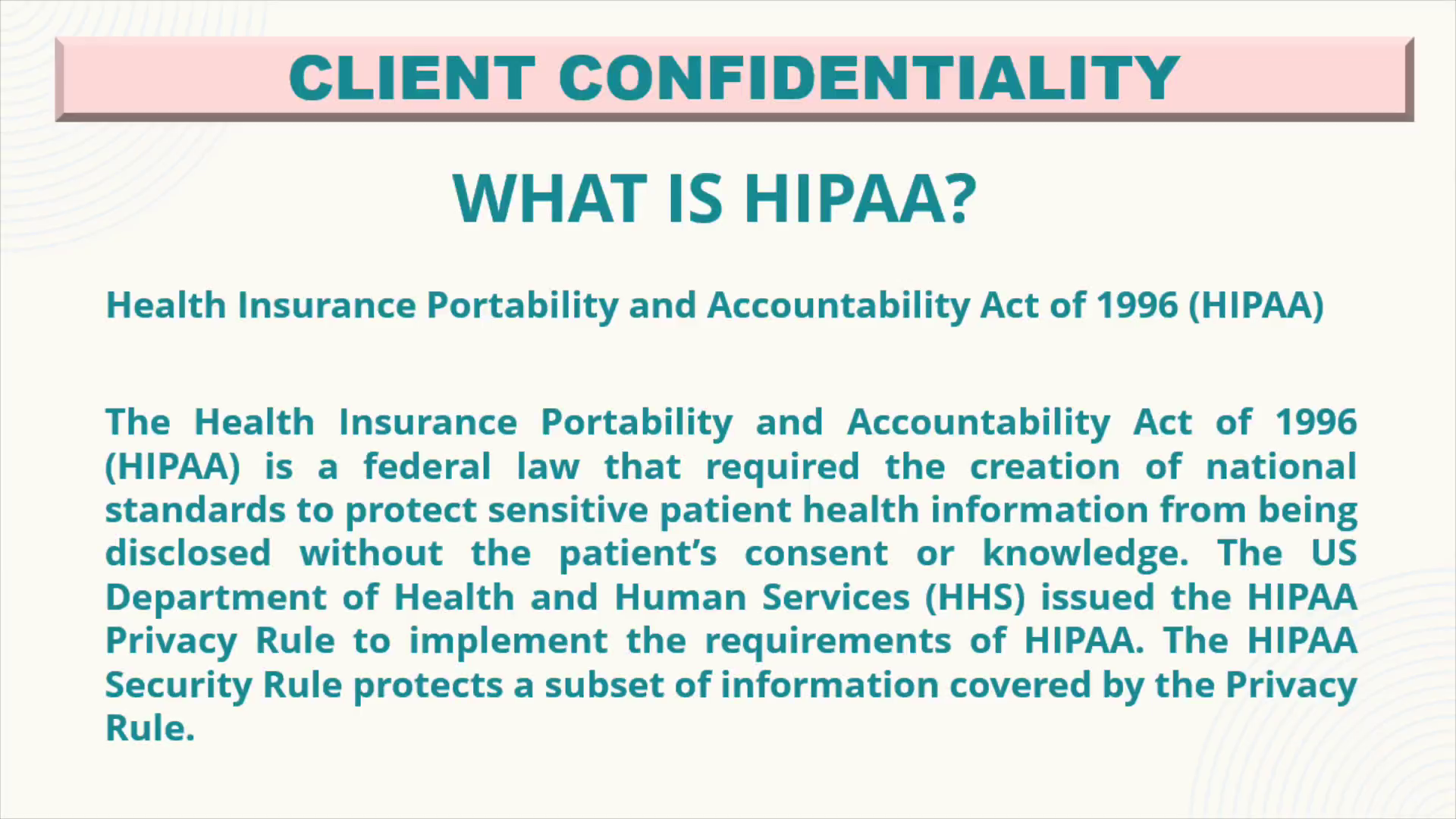
Creative solutions companion care service llc caregiver training for pbc in home services
Scene 1 (0s)
[Audio] Client confidentiality WHAT IS HIPAA? Health Insurance Portability and Accountability Act of 1996 (HIPAA) The Health Insurance Portability and Accountability Act of 1996 (HIPAA) is a federal law that required the creation of national standards to protect sensitive patient health information from being disclosed without the patient's consent or knowledge. The US Department of Health and Human Services (HHS) issued the HIPAA Privacy Rule to implement the requirements of HIPAA. The HIPAA Security Rule protects a subset of information covered by the Privacy Rule..
Scene 2 (45s)
[Audio] HIPAA Privacy Rule The Privacy Rule standards address the use and disclosure of individuals' health information (known as protected health information or PHI) by entities subject to the Privacy Rule. These individuals and organizations are called "covered entities." The Privacy Rule also contains standards for individuals' rights to understand and control how their health information is used. A major goal of the Privacy Rule is to make sure that individuals' health information is properly protected while allowing the flow of health information needed to provide and promote high-quality healthcare, and to protect the public's health and well-being. The Privacy Rule permits important uses of information while protecting the privacy of people who seek care and healing..
Scene 3 (1m 34s)
[Audio] What are Clients Rights and Confidentiality? Rights: A person's right to control their protected health information is based on their right to control the health care itself. Confidentiality: The services that Creative Solutions CCS caregivers perform for clients are not anyone else's business..
Scene 4 (1m 58s)
[Audio] How does HIPAA protect client rights? It creates national standards to protect individuals' medical records and other personal health information. It sets boundaries on the use and release of health records and information. It standardizes used to send client health information. It establishes civil penalties that hold violators accountable..
Scene 5 (2m 25s)
[Audio] How is confidentiality most often violated? Client-related information is left exposed where visitors or unauthorized individuals can see it. Client information is discussed in a public place or with inappropriate, unauthorized individuals. Unauthorized people hear client-sensitive information. Client records are accessed for the wrong reasons or by inappropriate individuals..
Scene 6 (2m 53s)
[Audio] The duty of care encompasses the legal and moral responsibility that caregivers have towards their clients, ensuring their safety, well-being, and overall best interests. By comprehending this duty, caregivers can make informed decisions that prioritize the physical, emotional, and psychological welfare of their clients..
Scene 7 (3m 15s)
[Audio] Privacy obligations, on the other hand, pertain to the sensitive nature of personal information shared by clients, which must be handled with the utmost confidentiality and respect (Bani Issa et al., 2020). Caregivers often have access to intimate details of a client's life, such as medical history, family dynamics, and personal preferences. Recognizing and respecting the privacy of this information establishes a foundation of trust between the caregiver and the client. It reassures the client that their vulnerabilities are not exposed without consent and reinforces the caregiver's commitment to maintaining a professional and trustworthy relationship..
Scene 8 (3m 57s)
[Audio] By understanding these obligations, caregivers can avoid potential legal liabilities and ethical dilemmas that may arise from mishandling personal information or neglecting their duty of care. Breaches of privacy can lead to violations of confidentiality, eroding the client's trust, and damaging the caregiver's reputation. Moreover, a failure to uphold the duty of care can result in physical harm, emotional distress, or neglect for the client, leading to severe consequences for both parties involved..
Scene 9 (4m 30s)
[Audio] In a broader context, recognizing and respecting the duty of care and privacy obligations contributes to a culture of professionalism within the caregiving industry. It elevates the quality of care provided, as caregivers are equipped to make well-informed decisions that align with ethical guidelines and legal standards. This, in turn, enhances the overall well-being of clients and fosters a positive perception of the caregiving profession..
Scene 10 (4m 58s)
[Audio] Furthermore, compliance with duty of care and privacy obligations demonstrates caregivers' commitment to human rights and dignity. It acknowledges the inherent worth of each individual and their right to autonomy and respect, irrespective of their physical or mental condition. By safeguarding personal information and ensuring a safe environment, caregivers uphold the principles of fairness and equality, fostering an inclusive and compassionate caregiving approach..